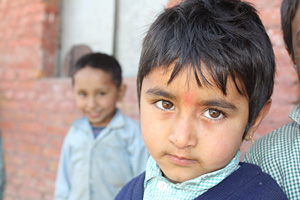NEPAL: HIV-positive children, orphans neglected
In the village of Rakam in Dailekh District, about 700km northwest of the Nepalese capital, Kathmandu, 12-year-old Ravi* is living with HIV and has no idea if he will finish his education.

There are close to 5,000 children under 14 years of age living with HIV in Nepal today
"I feel weak all the time. My uncle is tired of hearing my complaints," he told IRIN. Barely six when he lost his parents to AIDS-related illnesses, he now lives with his father's brother and family, who are struggling to support him.
It is proving a challenge. They can't even afford the bumpy eight-hour bus journey to the nearest city of Surkhet for his CD4 count test, which measures immune strength.
According to the National Centre for AIDS and sexually transmitted disease (STD) Control (NCASC), there are close to 5,000 children under 14 years of age living with HIV in Nepal today, but local NGOs and health workers estimate the real number to be much higher.
"There could be many more orphans and children living with HIV, but the government of Nepal has failed to pay any attention to their plight. Supplying medicines is not enough," said AIDS activist Deepa Bohara, the coordinator for NGO Parivartan ko Lagi Pahuch (Access for Change).
There are as many as 15 HIV-positive orphans and children in Dailekh alone, the group reported. "We are extremely worried about the welfare of these children. We hope to get enough government support to help them," said Khagendra Jung Shah, chief of the Dailekh District Hospital.
His office can only provide life-prolonging antiretroviral drugs - there is no separate budget to give these children any social support. Moreover, there are no programmes to sponsor their education, pay for medical expenses or offer psychosocial counselling.
Dailekh is one of the poorest districts in the country, with most people living on less than US$1 per day, according to government figures.
Stigma remains high in Nepal, and HIV-positive orphans sometimes face neglect from relatives after their parents die. In one extreme case six months ago, a five-year-old orphaned HIV-positive child (name withheld upon request) died of exposure after his relatives forced him to sleep in the barn out of fear that he would infect the other children.
"I don't fear dying from AIDS, but constantly worry about the day when my mother dies and I will be alone in this world," said Ashim *, 10, who lives with his HIV-positive mother.
"We are extremely worried, not only about the orphans, but also those whose HIV-positive parents are alive. What happens after their parents die?" said another health worker, Sushil Bikram Thapa from Nepal STD and AIDS Research Centre, a local NGO.
According to the National Centre for AIDS and STD Control in the Ministry of Health and Population, there are more than 50,000 adults and children living with HIV, and an estimated overall prevalence of 0.30 percent in the adult population (15-49 years old).
Source: IRIN
- 498 reads
Human Rights
Ringing FOWPAL’s Peace Bell for the World:Nobel Peace Prize Laureates’ Visions and Actions

Protecting the World’s Cultural Diversity for a Sustainable Future

The Peace Bell Resonates at the 27th Eurasian Economic Summit

Declaration of World Day of the Power of Hope Endorsed by People in 158 Nations

Puppet Show I International Friendship Day 2020

